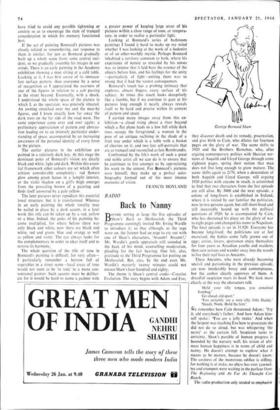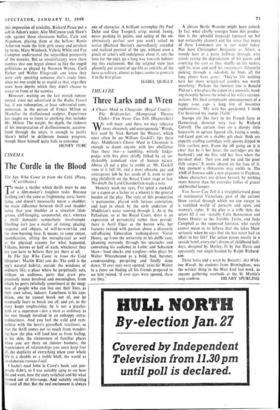RADIO
Back to Nanny
BEFORE setting at large the five episodes of Shaw's Back to Methuselah, the Third Programme cunningly invited Mr. Irving Wardle to introduce it; so that although, as the saga wore on, the listener had an urge to cry out with one of Shaw's characters, `Avaunt! Avaunt!,' Mr. Wardle's gentle appraisals still sounded in the back of his mind, counselling moderation, pleading for the fair hearing. One felt, also, gratitude to the Third Programme for putting on Methuselah. But, alas, by the end even Mr. Wardle's masterly twenty minutes could not excuse Shaw's four hundred and eighty.
The theme is Shaw's central credo—Creative Evolution. The story begins with Adam and Eve; George Bernard Shaw they discover death and its remedy, procreation, and give birth to Cain, who dilates for fourteen pages on the glory of war. The scene shifts to 1920 and the Brothers Barnabas, who, after arguing contemporary politics with Shavian ver- sions of Asquith and Lloyd George through some eighteen pages, spring their notion that man does not live long enough to grow mature. The scene shifts again to 2170, when a descendant of both Asquith and Lloyd George, still arguing 1920 politics with anyone in reach, is astonished to find that two characters from the last episode are still alive. By 3000 and the next episode, a colony of long-livers is established in Ireland, where it is visited by our familiar the politician, now in two persons again, but still short-lived and still inexorably bound up with the political questions of 1920; he is accompanied by Cain, who has shortened his piece on the glory of war to eight pages and changed his name to Napoleon. The final episode is set in 31,920. Everyone has become long-lived; the politicians are at last exorcised; the babies come fully grown out of eggs; artists, lovers, sportsmen enjoy themselves for four years as Arcadian youths and maidens, then turn serious and wander away into the woods to live their real lives as Ancients.
These Ancients, who were already becoming uncivil and patronising in the previous episode, are now intolerably bossy and contemptuous, but the author clearly approves of them. A dreadful suspicion rears its head. We look more clearly at the way the characters talk.
'Hold your silly tongue, you conceited humbug.'
'Go ahead, old sport.'
`You certainly are a very, silly little Daddy.' `Steady. Nunk. Hold the fort' We remember how Cain threatened Adam : `Try it, old everybody's father.' And how Adam him- self spoke: 'You are a jolly snake.' And when the Serpent was teaching Eve how to procreate she did not do so aloud, but was whispering 'the secret' as the curtain fell. Suspicion turns to certainty. Shaw's parable of human progress is bounded by the nursery wall, his vision of ulti- mate human happiness is in terms of child and nanny. He doesn't attempt to explore what it means to be mature, because he doesn't know/
The cosiness of the monstrous edifice is stifling, for nothing is at stake, no abyss has ever yawned,
tea and crumpets were waiting in the parlour from The Beginning and As Far As Thought Can Reach.
The radio production only tended to emphasise this impression of triviality. Richard Pasco put a sob in Adam's voice; Alec McCowen took Shaw's side against those classroom bullies, Cain and Napoleon, playing them at the bellow; Renee Asherson made the little girls saucy and petulant by turns; Mary Wimbush, Valerie White and Fay Compton underscored the unjustified pomposity of the nannies. But so unsatisfactory were these nannies that one began almost to like the stupid politicians as played by Norman Wynne, Cecil Parker and Walter Fitzgerald; one knew they were only speaking someone else's crude lines, since no one could be as stupid as that, ergo they must have depths which they didn't choose to reveal in front of the nannies.
However, waiting on the last stretch (unsus- pected, since not advertised in the Radio Times) lay, if not redemption, at least substantial com- pensation. in the person of Ernest Milton as Martellus the disillusioned sculptor. Experience has taught me to listen to anything that includes Mr. Milton. The weight, the depth, the richness of his interpretation of disillusionment, accumu- lated through the years, is enough to justify Shaw's belief in deliberate human progress, though Shaw himself quite fails to convince.
HENRY TUBE



































 Previous page
Previous page